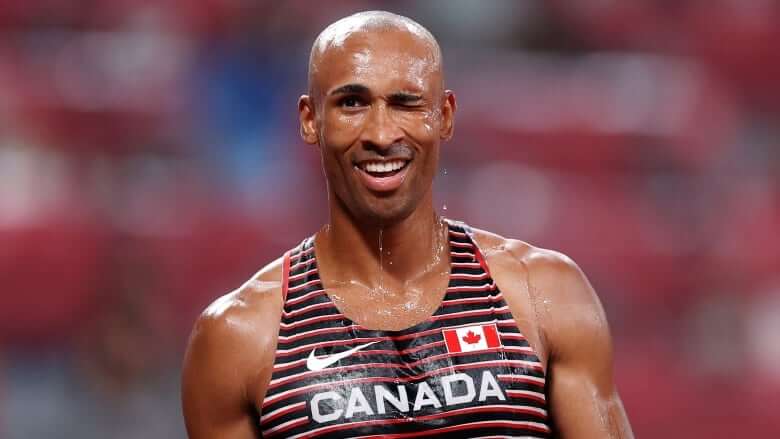Canada’s Damian Warner strikes gold in Olympic decathlon

On a steamy night in Tokyo, Damian Warner was as cool as can be, recording the highest score ever in Olympic decathlon on his way to Canada’s first gold medal in one of the Games’ oldest and most storied events.
‘Now he’s a legend’: Andre De Grasse wins Olympic gold in men’s 200m
“It’s been a long two days. When you go through the whole battle of the decathlon and finally finish and you get the result you were looking for, there is no greater feeling. This is a dream come true,” Warner said.
“I’ve never been in this position when one of my dreams came true. I don’t even know how to react right now,” added Warner, who at 31 years old was the oldest competitor in this 21-man field.
Warner, whose 9,018 points are also a new Olympic record, made it known from the beginning of this two gruelling, two-day event that he was the man to beat in Tokyo and deserving of the unofficial title of “the world’s greatest athlete.”
In the 100 metres, the first of 10 decathlon events, Warner put down a blistering 10.12 seconds, a time that would have nearly qualified him for the men’s 100-metre final a few nights ago. He followed that up by soaring 8.24 metres in the long jump, which would have been enough for a bronze in the men’s long jump.
On Thursday, the London, Ont., native added an Olympics-best time of 13.46 seconds in the 110-metre hurdles and a personal best in the pole vault, an event that has given him problems in the past.
Bring on the cheers
Find live streams, must-watch video highlights, breaking news and more in one perfect Olympic Games package. Following Team Canada has never been easier or more exciting.
He capped off the competition running the 1,500 metres in four minutes 31.08 seconds to cement the gold.
Add it all up and it was a performance for the ages and will surely become one of the great moments in Canada’s Olympic history.
“I’m just grateful. Throughout my whole career, I’ve just felt like the luckiest athlete in the world,” Warner said. “I came from a situation where I really didn’t have any goals or dreams and lucky enough I found coaches who believed in me and made sure I was on the right path.
“There were ups and downs just like every athlete has and it’s just kind of a storybook ending.”
‘Like Wayne Gretzky’
In decathlon, 9,000 points is the holy grail for a competitor, only achieved three times previously.
France’s Kevin Mayer, the silver medallist Thursday night, has the highest score ever, recording 9,126 in 2018.
“Nine-thousand points is one of those magical barriers. Earlier this year in Austria, I missed it by five points. I thought then that I blew the opportunity,” Warner said. “Fortunately, I got another shot. I almost let it go in the 1,500 but I fought as hard as I could and … and I joined that club with only four other guys.”
Fellow Canadian Pierce LePage, of Whitby, Ont., finished fifth in his Olympic debut.
“[LePage]’s in a similar position as me in my first Olympics where I finished fifth,” Warner said. “He has nowhere but up to go; he’s a once in a lifetime talent. Watch out for that guy.”
Michael Smith, who competed in the decathlon in three Olympics for Canada, never thought he would see what Warner achieved.
“It’s like Mike Weir winning the Masters. It’s like Wayne Gretzky winning the Stanley Cup. This is the pinnacle of sport. Golf is awesome, hockey is awesome, but track and field is bigger,” said Smith, an analyst for CBC Sports in Tokyo.
“It’s the best of the best, it’s the top of Mt. Everest. Nine thousand points, only the fourth man in history to do it.”
Warner won a bronze medal in Rio in 2016. Fellow Canadian decathlete Dave Steen captured the bronze at the 1988 Seoul Olympics.
The idea that the decathlon champion is the world’s greatest athlete goes back more than 100 years. At the 1912 Stockholm Olympics, after American Jim Thorpe’s decathlon victory, King Gustav of Sweden told Thorpe: “Sir, you are the world’s greatest athlete.”
What Warner accomplished was achieved amid brutally stifling conditions, with temperatures creeping toward 40 C on both days. Night brought little relief, with heavy, humid air trapped inside of the cavernous stadium.
“It was kind of advertised that these were going to be the hottest Games ever. I am at my third Olympics, and I can verify that these are the hottest ones in which I have competed,” Warner said.
For Warner, his performance so far in Tokyo is remarkable considering what it took to get here.
All athletes faced hurdles during the pandemic, but few (who weren’t hockey players) had to shift their training to a hockey arena.
Unconventional training leads to gold
After Western University, where the 31-year-old had been training, shuttered its facilities because of COVID-19, Warner was without a home only nine months before Tokyo.
His coach, Gar Leyshon, eventually made an arrangement with the City of London for Warner to continue training at the city’s nearly 70-year-old Farquharson Arena.
There, his coach fashioned a makeshift pole vault area, brought in the necessary pads for high jump and cobbled together a ring of discus and javelin.
The arena was 55 metres long, meaning Warner could only run full speed for 40.
“I think that to be a good decathlete, you have to be adaptable because the only certain thing that there is going into a decathlon is that something’s going to go wrong,” Warner told CBC Sports.
In Tokyo, Warner could do no wrong. Everything he touched turned to gold.








Redes Sociais - Comentários